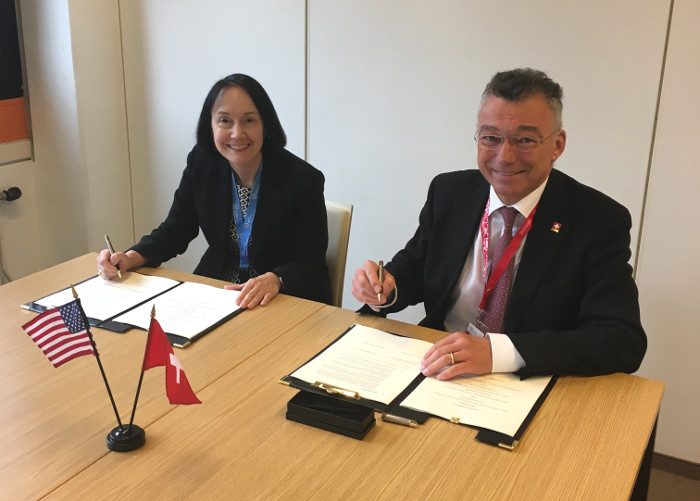Switzerland renews bilateral agreement for nuclear safety with the USA

Switzerland extended its agreement with the United States with regard to the exchange of technical information and collaboration on issues of nuclear safety. The renewal between the Swiss Federal Nuclear Safety Inspectorate ENSI and the U.S. Nuclear Regulatory Commission US NRC took place at the General Conference of the International Atomic Energy Agency IAEA in Vienna.
“The cooperation with the U.S. NRC is always fruitful because it allows us to share regulatory experience and technical information. This is particularly important in the area of decommissioning, aging management and regulatory safety research”, says ENSI Director General Hans Wanner at the signing of the renewed agreement. He adds: “Most of the Swiss reactors originate from the USA. This is another reason for the importance of regular exchange with the US NRC.”
The bilateral agreement with the USA was first signed on 9 December 1974 and has to be renewed every 5 years. It was extended in 2012.
Why does ENSI foster international cooperation with other countries?
The ultimate goal of ENSI’s international cooperation is the continuous worldwide improvement of nuclear safety and security through active participation in the international regulatory exchange of information and experience. “We want to play an active role in the further development of international standards and their implementation,” emphasizes Hans Wanner.
The four positions of the Swiss commitment
Presence
- ENSI is represented in the main international bodies that focus on the exchange of information and experiences, on the latest advances in science and technology, and on harmonising safety provisions and requirements.
- In these bodies, ENSI spearheads the ongoing improvement of nuclear supervision on a global level, thereby fulfilling its responsibilities together with other relevant players at federal level.
Transparency
- ENSI informs the public about its international activities. For this purpose, it reports the results of international conferences, developments concerning science, technology, international standards and regulations, and lessons learned from events in nuclear plants outside of Switzerland.
- ENSI publishes Switzerland’s periodic national reports regarding compliance with international agreements and conventions, and the reports by international experts who periodically review ENSI itself or Switzerland’s nuclear facilities to determine their compliance with IAEA requirements.
- At the international level, ENSI is committed to ensuring that knowledge acquired about nuclear safety issues is communicated transparently.
- ENSI also advocates an open and constructive international exchange of experiences.
Expertise
- ENSI’s employees are familiar with the latest international developments in science and technology in their areas of supervision.
- By contributing its expertise in international bodies, ENSI aims to play its part in the development of international safety provisions and to support safety-oriented requirements.
- ENSI fosters the ongoing development of science and technology through its contributions to regulatory safety research and its participation in the major international specialist bodies.
- ENSI’s regulatory framework and supervisory activities take account of current international safety provisions as well as lessons learned from important events and findings from inspections in foreign nuclear facilities.
Independence
- Switzerland fully meets the IAEA’s requirements for the effective independence of regulatory supervision of nuclear facilities and materials.
- ENSI consults internationally recognised experts to obtain second opinions on supervisory decisions so that they are supported by a broader basis of technical expertise.
- ENSI systematically verifies whether the Swiss regulatory framework for nuclear safety and security meets the latest international standards, and it invites periodic reviews by international experts to determine whether it meets the IAEA requirements.
- At international level, ENSI advocates that nuclear regulatory authorities should be set up independently and that they should also be able to act independently.
- ENSI encourages the international community to carry out independent international review missions of their regulatory authorities and nuclear facilities.

